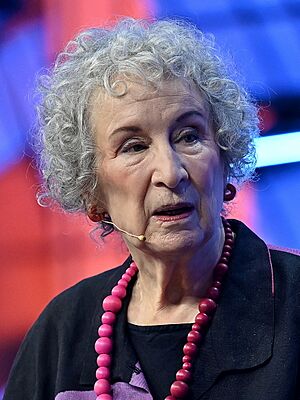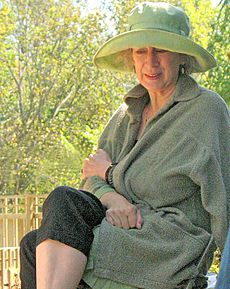Margaret Atwood facts for kids
Quick facts for kids
Margaret Atwood
|
|
|---|---|

Atwood in 2022
|
|
| Born | Margaret Eleanor Atwood November 18, 1939 Ottawa, Ontario, Canada |
| Education | |
| Period | 1961–present |
| Genre |
|
| Notable works |
|
| Spouse |
Jim Polk
(m. 1968; div. 1973) |
| Partner | Graeme Gibson (1973–2019; his death) |
| Children | 1 |
| Signature | |
Margaret Eleanor Atwood (born November 18, 1939) is a famous Canadian writer. She is known for her novels, poems, and essays. She is also a literary critic and an inventor. Since 1961, she has published many books, including 18 novels, 18 poetry books, and eight children's books.
Her most famous book is The Handmaid's Tale, a dystopian novel from 1985. A dystopian story is about an imaginary future world where life is very difficult and unfair. Atwood has won many awards for her writing, including two Booker Prizes. Many of her books have been turned into movies and TV shows.
Atwood's stories often explore big ideas like identity, myths, and the power of language. She also writes about climate change and how power affects people. Many of her poems are inspired by the myths and fairy tales she loved as a child.
Besides writing, Atwood helped start the Griffin Poetry Prize and the Writers' Trust of Canada. She also invented the LongPen, a device that lets her sign books for fans from far away using a robot arm.
A Childhood in Nature
Margaret Atwood was born on November 18, 1939, in Ottawa, Ontario, Canada. She was the second of three children. Her father, Carl Edmund Atwood, was an entomologist (a scientist who studies insects). Her mother, Margaret Dorothy Killam, was a dietitian.
Because of her father's work, Atwood spent a lot of her childhood in the forests of northern Quebec. The family moved between Ottawa, Sault Ste. Marie, and Toronto. She didn't go to school full-time until she was 12 years old.
Atwood loved to read everything she could find. She read mysteries, Grimms' Fairy Tales, stories about Canadian animals, and comic books. She started writing poems and plays when she was only six. At age 16, she knew she wanted to be a professional writer.
Education and Early Career
In 1957, Atwood began studying at Victoria College in the University of Toronto. She published her poems and articles in the college's literary journal. She graduated in 1961 with a degree in English and also studied philosophy and French.
After graduating, she went to Radcliffe College at Harvard University for more studies. She earned a master's degree in 1962.
Atwood's first book of poetry, Double Persephone, was published in 1961. She began teaching English at universities in Canada while continuing to write. In 1966, her poetry collection The Circle Game won the important Governor General's Award. Her first novel, The Edible Woman, was published in 1969.
Personal Life
Atwood has an older brother, Harold, and a younger sister, Ruth. She was married to an American writer named Jim Polk from 1968 to 1973.
Later, she began a relationship with another novelist, Graeme Gibson. They moved to a farm near Alliston, Ontario, where their daughter, Eleanor, was born in 1976. The family moved back to Toronto in 1980. Atwood and Gibson were together until he passed away in 2019.
Even though she is a great writer, Atwood says she is "a terrible speller" and uses both a computer and pen and paper to write.
Famous Books and Big Ideas
Atwood's writing career grew throughout the 1970s and 1980s. She published many poetry collections and novels that explored what it means to be a woman and a Canadian.
The Handmaid's Tale and Other Novels
In the 1980s, Atwood became world-famous. She wrote The Handmaid's Tale (1985), which won several awards. The book is a work of speculative fiction. This means it explores "what if" questions about society and technology. Atwood has said that everything in the book was inspired by real events from history.
She also wrote Cat's Eye (1988), a story about childhood friendships and memories. In the 1990s, she published The Robber Bride (1993) and Alias Grace (1996), a historical novel about a real-life mystery in 1843.
In 2000, her novel The Blind Assassin won the Booker Prize, one of the most famous awards for literature.
The MaddAddam Trilogy
Atwood also wrote a series of books known as the MaddAddam Trilogy: Oryx and Crake (2003), The Year of the Flood (2009), and MaddAddam (2013). These books are set in a future world that has been changed by climate disasters and genetic engineering.
The series looks at the dangers of technology when it's not used carefully. Atwood said that the science in these books is based on real technology that exists or is being developed today.
A Sequel to The Handmaid's Tale
In 2019, Atwood published The Testaments, a sequel to The Handmaid's Tale. The story is set 15 years after the first book ends. It was a huge success and was a joint winner of the 2019 Booker Prize.
Other Creative Projects
Atwood is always trying new things. She has written for opera, created graphic novels, and even contributed to a special library of the future.
Graphic Novels and Future Library
In 2016, Atwood started writing a superhero comic book series called Angel Catbird. The story is about a scientist who accidentally gets the powers of a cat and a bird.
She also wrote a novel called Scribbler Moon for the Future Library project. This book will be kept safe and secret in a library in Norway. It will not be published until the year 2114, one hundred years after it was written. Atwood said the project feels "magical," like the story of Sleeping Beauty.
Activism and Public Life
Atwood often speaks about issues she cares about, like the environment and human rights. She and her partner Graeme Gibson were honorary presidents of the Rare Bird Club at BirdLife International.
She has also been involved in politics. She has encouraged Canadians to vote and has spoken out on important issues. Her book The Handmaid's Tale has become a symbol for women's rights protests around the world. People often dress up in the red robes and white bonnets from the story.
Adaptations of Her Work
Many of Atwood's books have been turned into popular movies and TV shows.
- The Handmaid's Tale: A TV series based on her novel began in 2017. It became very popular and won many awards. Atwood even made a small guest appearance in the first episode.
- Alias Grace: This novel was adapted into a six-part TV miniseries in 2017.
- Other Works: Her novels Surfacing and her short stories have also been adapted for the screen.
Awards and Honors
Atwood has received many awards and honors from all over the world. She has won the Governor General's Award twice and the Booker Prize twice. She is a Companion of the Order of Canada, which is one of the country's highest honors. She also has many honorary degrees from universities like Oxford, Cambridge, and Harvard University.
A List of Major Works
Here are some of Margaret Atwood's most well-known books.
Novels
- The Edible Woman (1969)
- Surfacing (1972)
- The Handmaid's Tale (1985)
- Cat's Eye (1988)
- Alias Grace (1996)
- The Blind Assassin (2000)
- Oryx and Crake (2003)
- The Penelopiad (2005)
- The Testaments (2019)
Poetry Collections
- The Circle Game (1964)
- The Journals of Susanna Moodie (1970)
- Morning in the Burned House (1995)
- Dearly (2020)
Children's Books
- Up in the Tree (1978)
- Princess Prunella and the Purple Peanut (1995)
- Rude Ramsay and the Roaring Radishes (2003)
See also
 In Spanish: Margaret Atwood para niños
In Spanish: Margaret Atwood para niños
- Southern Ontario Gothic
- Canadian poetry
- List of Canadian poets
- List of Canadian writers
 | Sharif Bey |
 | Hale Woodruff |
 | Richmond Barthé |
 | Purvis Young |


